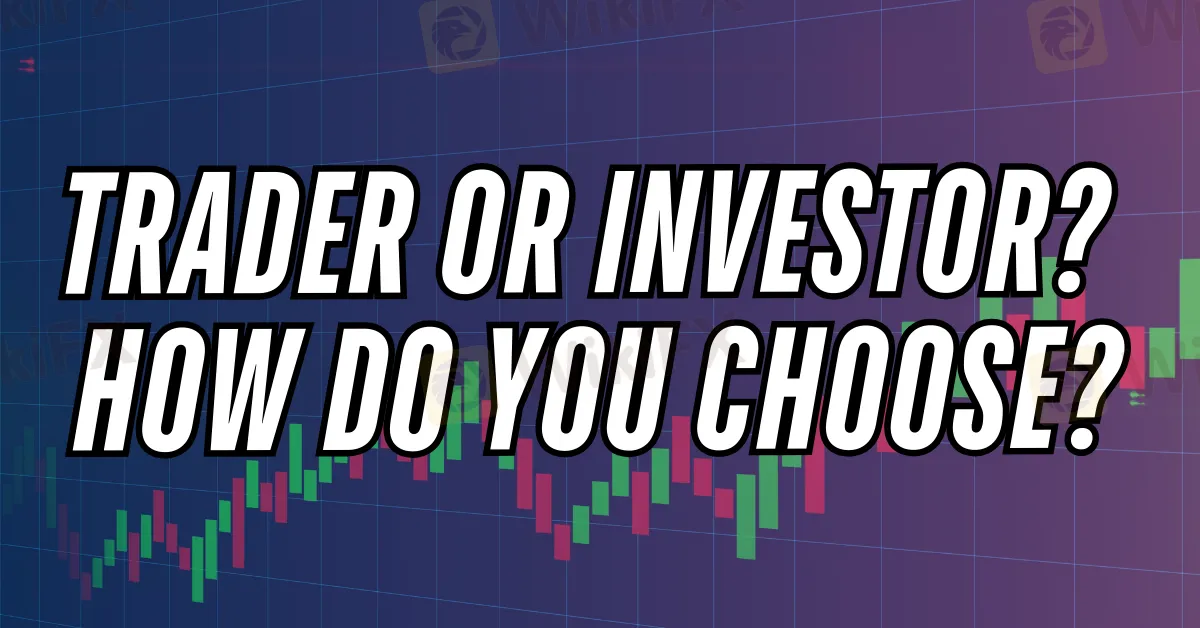简体中文
繁體中文
English
Pусский
日本語
ภาษาไทย
Tiếng Việt
Bahasa Indonesia
Español
हिन्दी
Filippiiniläinen
Français
Deutsch
Português
Türkçe
한국어
العربية
Trader or Investor? How Do You Choose?
Abstract:In the dynamic world of financial markets, individuals often find themselves grappling with a fundamental question: should they pursue trading or investing?

In the dynamic world of financial markets, individuals often find themselves grappling with a fundamental question: should they pursue trading or investing? While both paths offer the potential for profit, they entail different strategies, mindsets, and risk profiles. Understanding the key distinctions between trading and investing is crucial for anyone looking to enter the financial markets.
The primary difference between traders and investors lies in their time horizons and strategies. Traders focus on short-term market movements, seeking to capitalize on price fluctuations over days, weeks, or even minutes. They rely heavily on technical analysis, using charts and indicators to make rapid decisions. Trading demands constant attention and quick reflexes, as market conditions can change in the blink of an eye.
In contrast, investors adopt a long-term perspective, often holding assets for years or even decades. Their approach is rooted in fundamental analysis, evaluating a company's financial health, growth potential, and overall market position. Investors aim to build wealth gradually through the appreciation of their holdings and dividends. Patience and discipline are their watchwords, as they ride out market volatility in pursuit of steady, compounded returns.
Both trading and investing carry inherent risks and rewards, but they do so in different ways. Traders can achieve significant profits quickly, but the fast-paced nature of their activities also exposes them to substantial losses. The use of leverage, a common practice in trading, can amplify gains but also magnify losses. This high-stakes environment requires traders to have a strong risk management strategy and the emotional fortitude to handle rapid changes.
Investors, while not immune to market downturns, generally experience less volatility in their portfolios. By focusing on well-established companies with strong fundamentals, investors can mitigate some of the risks associated with market fluctuations. The trade-off, however, is that investment returns may be slower and less dramatic compared to the potential windfalls of successful trading.

Choosing between trading and investing also involves a deep understanding of one's personal attributes and lifestyle preferences. Trading requires a high tolerance for risk, a willingness to spend significant time analysing markets, and the ability to make quick, decisive actions. It can be a full-time endeavour, demanding constant vigilance and the resilience to handle stress.
Investing, on the other hand, suits individuals who prefer a more hands-off approach. It allows for a balance between other professional or personal commitments and requires less day-to-day involvement. Investors need patience, a long-term outlook, and the discipline to stick to their strategy even during market downturns.
Ultimately, the choice between trading and investing is a personal one, influenced by individual goals, risk tolerance, and lifestyle. Some may find a hybrid approach, engaging in both trading and investing, to be the most satisfying. Regardless of the path chosen, success in the financial markets hinges on continuous learning, disciplined execution, and an unwavering commitment to one's chosen strategy. The financial landscape is vast and varied, offering opportunities for both traders and investors to thrive. The key is to choose the path that aligns best with your personal strengths and financial objectives.

Disclaimer:
The views in this article only represent the author's personal views, and do not constitute investment advice on this platform. This platform does not guarantee the accuracy, completeness and timeliness of the information in the article, and will not be liable for any loss caused by the use of or reliance on the information in the article.
Read more

Axi Bids AUD 52M to Acquire Low-Cost Broker SelfWealth, Outbidding Competitor Bell Financial
This acquisition attempt by AxiCorp Financial Services Pty Ltd, Axi’s parent company, values SelfWealth at AUD 0.23 per share and is notably higher than a recent bid made by Bell Financial Group Limited (ASX), which offered AUD 0.22 per share.

Crypto Influencer's Body Found Months After Kidnapping
The body of missing crypto influencer Kevin Mirshahi, abducted in June, was found in Montreal. A woman has been charged in connection with his murder.

Warning Against Globalmarketsbull & Cryptclubmarket
Are you thinking about investing in Globalmarketsbull or Cryptoclubmarket? Think again! The Financial Conduct Authority (FCA) issued a warning about these two firms. Here are the details of these unlicensed brokers.

Why Even the Highly Educated Fall Victim to Investment Scams?
Understanding why educated individuals fall victim to scams serves as a stark reminder for all traders to remain vigilant, exercise due diligence, and keep emotions firmly in check.
WikiFX Broker
Latest News
CySEC Warns Against Unauthorized Investment Firms in Cyprus
Why Even the Highly Educated Fall Victim to Investment Scams?
Warning Against Globalmarketsbull & Cryptclubmarket
Dukascopy Bank Expands Trading Account Base Currencies
UK Sets Stage for Stablecoin Regulation and Staking Exemption
Axi Bids AUD 52M to Acquire Low-Cost Broker SelfWealth, Outbidding Competitor Bell Financial
Crypto Influencer's Body Found Months After Kidnapping
STARTRADER Issues Alerts on Fake Sites and Unauthorized Apps
Italy’s CONSOB Blocks Seven Unregistered Financial Websites
Bitfinex Hacker Ilya Lichtenstein Sentenced to 5 Years in Prison
Currency Calculator


